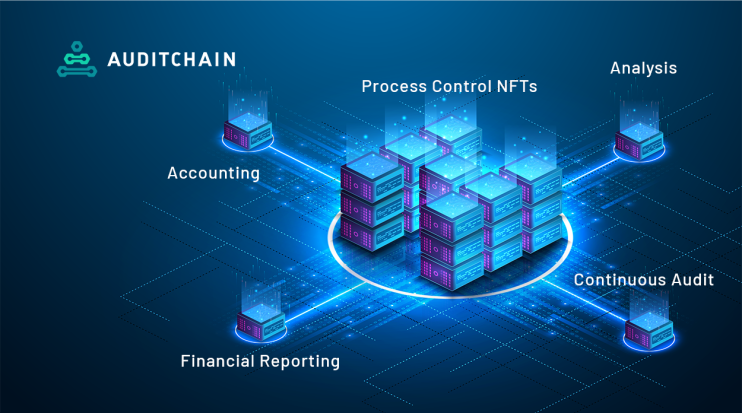Can Bitcoin style validation solve financial statement fraud?

A financial professional in the United States suggested that the stock market would crash if real time assurance and reporting were a thing. Does that mean that the majority of listed companies are lying in their financial statements?
An audit is supposed to help to ensure that management does not abuse positions of trust. And therefore, external auditors have long been regarded by the public at large as the providers of trust and a cornerstone of confidence in the world’s financial system.
The perception of the public is that auditors are required to verify a company’s books to provide assurance that everything is in order. However, history has repeated itself on numerous occasions with the demise of Carillion, Thomas Cook, Patisserie Valerie, and most recently, the impending failure of Evergrande, on the inability of auditors to spot a looming disaster and protect the interest of the investors.
How many disagreements with management were filed with regulators by auditors in the periods leading up to the 2008 financial crisis? Did they have an obligation to file such disagreements? Don’t you think they saw what was coming?
Why are auditors regarded as the white knights by many, yet fail so often to warn the public on an impending financial disaster? What are the limitations of the audit exercise?
Is the approach of conducting an audit flawed in nature since it is not able to audit the totality of transactions? It appears that this problem was solved on January 3, 2009.
Auditchain Labs out of Zug, Switzerland, who is the streaming partner at the CryptoAM Summit this week in London, seems to have combined an Ethereum layer 2 protocol with higher order semantic logic based on Xtensible Business Reporting Language “XBRL” to set the rules for the valid state of a reporting entity based on its reporting style and reporting scheme. XBRL is already mandated by Her Majesty’s Revenue and Customs and is a mandate in 49 other jurisdictions. The Financial Reporting Council in the UK is appointed with its charge.
Antiquated standards
An audit does not provide absolute assurance on the truth and fairness of the financial accounts since it does not verify 100% of the transactions. It applies a sampling approach. This methodology focuses on “materiality” and not accuracy. That is not what happens on the Bitcoin or Ethereum blockchain. Balances are proven all the way back to genesis based on validation of 100% of all transactions by an army of miners.
Auditors are not mandated to detect fraud, as standards on auditing ultimately places responsibility on management for the prevention and detection of fraud, auditors have always had a get out of jail free card.
Meanwhile audits are an annual mandate for listed companies. Accounting, audit and financial reporting services industry is growing at a rate of 5%-6% and is expected to reach £500 Billion by 2023. So if these independent sets of eyes are vindicated due to the number of caveats mutually agreed between both parties, and in some cases only get away with fines, are conventional audits actually part of the problem rather than the solution?
Prior to the advent of blockchain, we could have only wished for a technology that would allow 100% of transactions to be audited. But with blockchain, the prayers of the investors and those stakeholders who cannot affect the decisions of the companies they have an interest in, have been answered.
An audit and reporting virtual machine
Now imagine a world where 100% of all transactions, invoices, purchase orders, contracts can be continuously audited. Not once a year, but continuously over 365 days using a ‘clean-as-you-go’ approach and by a plurality of “external validators” running the Auditchain Protocol software dubbed: Pacioli. Where the books of the company do not even have to be closed and any stakeholder can rely on those financials at any time of the year, whether for an investment decision or simply to gauge the financial health of the company. That is what Auditchain is building: a decentralized accounting, reporting, audit and analysis virtual machine.

With a sampling approach that only reviews 5-10% of the annual transactions, auditors can miss fraud. But with 100% transaction inclusion and a cryptographic audit trail, it becomes cost prohibitive to commit fraud by the perpetrators and substantially raises the ability for auditors to detect fraud.
An enterprise can not only accurately articulate its financial state but audit becomes continuous and automated. From a computer science perspective, the modern enterprise is becoming a state machine. It’s accounts undergo changes in state. The Auditchain Virtual Machine, populated by an army of Chartered Accountants and CPAs validates all changes in state of the enterprise and the enterprise accurately articulates such changes.
Together with the technological transformation Auditchain has instigated, a paradigm shift is also required from the industry. Remember that technology alone doesn’t solve problems. People do. It doesn’t create prosperity. People do. In democratic nations, people also vote. Auditchain may be solving problems that regulators and governments cannot or will not.
The AUDT Token Generation Event is currently underway. AUDT is used for settlement of financial reporting and assurance obligations, royalty payments for developers and auditors of Process Control NFTs and for robust governance on the Auditchain Protocol.
The accounting, reporting and audit domain is highly centralized and complex. Chartered Accountants and other actors on the Auditchain Protocol collaborate as members of the DCARPE Alliance Association which sets standards and acts as the governance council for the Auditchain Protocol.
Jason Meyers
Auditchain